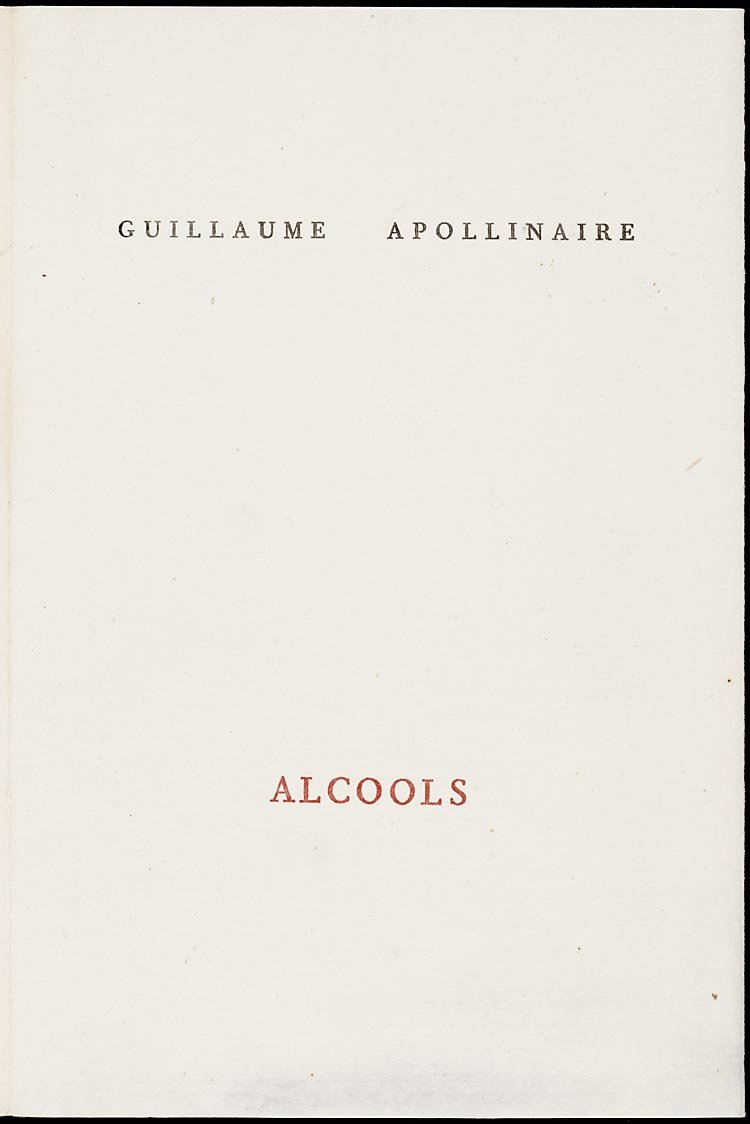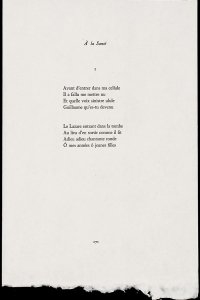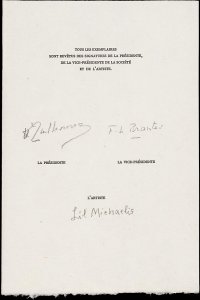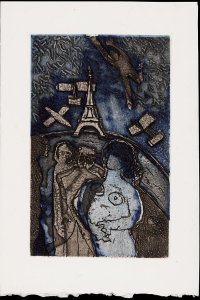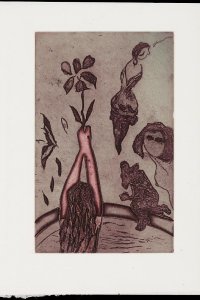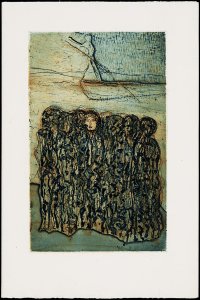Alcools
- Year:
- 1986
- Author:
- Guillaume Apollinaire (1880 - 1918)
- Artist:
- Lil Michaelis (1911 - 1987)
- Publisher:
- Parijs
A hundred and one bibliophile women
In spite of the innovative character of the poems, this new edition of Alcools is conservative; the typography is functional and the illustrations are remarkably figuretive for an artist's book from 1986. The burgundy case with the title Alcools on the spine is stylish but sobre. Perhaps it was the wish of Les Cent Une, the publisher and commissioner of the book, to remain true to the spirit of the Fin-de-Siècle. Les Cent Une, Société de Femmes Bibliophiles was founded in Paris in 1926 was in fact the first society of female lovers of bibliophile books. Membership was restricted to a hundred and one princesses, baronesses, marchionesses, duchesses, countesses and wives of famous writers. They are mentioned in the membership list as Madame Paul Claudel, Madame André Maurois and Madame Paul Morand.
The publisher's vignette of Les Cent Une (a snake reading a book in a tree) shows that reading is not just a men's business. In a playful way, it gives a positive feminist edge to the biblical story of the Fall of men, in which Eve is tempted by the snake to taste the fruit of the Tree of the knowledge of good and evil.
Swan song: etchings by Lil Michaelis
It was obvious that a female artist should illustrate Apollinaire's poems. That way, the presence of women in his work was emphasised: a gypsy girl, the 'dame en robe d'ottoman' and Salomé. In the world of artist's books, Lil Michaelis was unknown. As an autodidact she predominantly made collages and paintings. Between 1950 and 1976 she studied with Stanley William Hayter, who taught her etching. Hayter, who among other things had caused a revival of etching as an autonomous form of art, gave students and artists like Michaelis (and Alechinsky) room to experiment in his Atelier 17 in Paris. It was not until ten years later that Michaelis used her talent for a 'livre d'artiste', when she was commissioned by Les Cent Unes. In spite of paralysis she made sixteen copper engravings that express the melancholy tone of Alcools, an artist's book that has been called Michaelis' swan song; it would be her first and last. She died a year after its publication
Bibliographical description
- Description:
- Alcools / Guillaume Apollinaire ; [gravures de Lil Michaelis]; – Paris: Les Cent Une, Société des Femmes Bibliophiles, 1986. - 198 p. : ill. ; 31 cm
- Printer:
- Thierry Bouchard (Losne) (tekst); Georges Leblanc (Paris) (etchings)
- Edition:
- 127
- This copy:
- Number V of 127 copies on handmade Fleurac (Nersac) paper with the watermark of Les Cent Une, this copy printed for Madame Charles Le Tanneur. Signed by the artist, by the chairwoman, and by the deputy-chairwoman of Les Cent Une, Société de Femmes Bibliophiles
- Type:
- Pierre-Simon Fournier
- Shelfmark:
- KW KOOPM K 314
References
- Marcel Adéma, Guillaume Apollinaire: Souvenirs et témoignages inédits de Louis Gonzague Frick… [et al.]. Albi, Éditions de la Tête Noire, 1946
- Pierre Brunel, Apollinaire entre deux mondes: Le contrepoint mythique dans «Alcools». Paris, Presses Universitaires de France, 1997
- Laurence Campa, Michel Décaudin, Passion Apollinaire: La poésie en perte de vue. Paris, Textuel, 2004
- Michel Décaudin, Relire "Alcools". Paris, Lettres Modernes, 1996
- Michel Décaudin, 'Apollinaire', in: Dictionnaire de poésie de Baudelaire à nos jours. Paris, Presses universitaires de France, 2001, p. 16-23
- Raymond Hesse, Le livre d'après guerre et les sociétés de bibliophiles 1918-1928. Paris, Grasset, 1929
- Lil Michaelis, Lil Michaelis, 1911-1987: Collages, peintures, gravures de 1959 à 1987. Paris, Galerie Vieille du Temple, 1989
